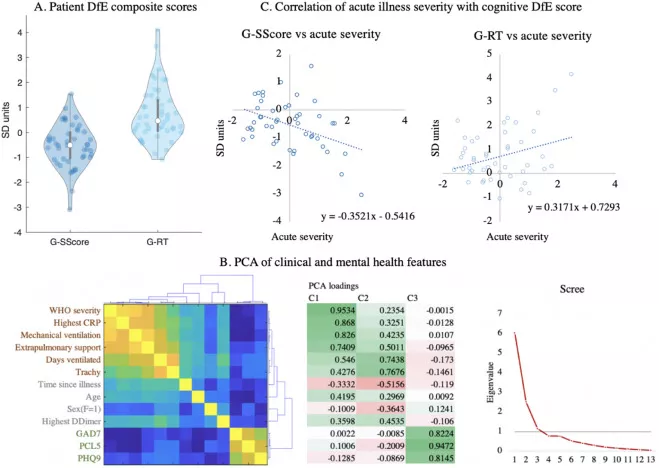A new study presents the most rigorous investigation to date into the long-term cognitive effects of severe covid-19. The study, led by scientists at Imperial College London and the University of Cambridge, found that cognitive deficits persist in hospitalized patients, equivalent to a decline consistent with 20 years of brain aging**
The new study, published in the Journal eClinical medicine, looked at 46 patients hospitalized for severe covid-19. Among them, 16 patients needed mechanical ventilation during hospitalization.
About six months after acute infection, participants completed a series of complex cognitive assessments. Each covid subject was paired with 10 age - and demographic matched healthy control subjects.
Senior author David Menon explained: "cognitive impairment is common in a variety of neurological diseases, including dementia and even conventional aging, but the pattern we see - the cognitive 'fingerprint' of covid-19 - is different from all these."
These covid patients responded slowly to the task and were less accurate than the matched control group. More specifically, covid patients performed poorly on "verbal analogical reasoning" tasks designed to test specific areas of word based reasoning cognition.

"At the neurological level, this damage pattern is consistent with the observation of subacute hypometabolism in the frontal system after covid-19 disease, which is known to be recruited in different combinations and configurations when performing these tasks," the scientists explained in a new study
The study found that the scale of these cognitive deficits was significantly correlated with the severity of each patient's acute disease. Patients with severe covid requiring hospital ventilation showed the most significant cognitive decline.
On average, the study calculated that the degree of cognitive impairment was equivalent to about 20 years of aging. Therefore, a 50 year old covid critically ill patient had a cognitive test score similar to that of a 70 year old.
These findings raise two big questions that researchers do not yet have good answers. What specifically caused these persistent cognitive deficits and whether patients recovered their cognitive abilities over a long period of time?
The researchers hypothesized a potential cause and pointed out that these cognitive problems could not be the result of sars-cov-2 infiltrating the brain, although some previous studies found that this was possible. On the contrary, the most reasonable explanation is that severe covid can lead to brain damage due to interruption of brain oxygen supply and coagulation or bleeding during acute disease. Excessive immune responses are also suspected to play a role in the persistent cognitive deficits seen in people after serious illness.
So will things get better over time? Menon said his team saw some small signs of improvement after long-term follow-up, but at best any cognitive recovery could be slow and gradual.
"We followed up some patients, at the latest 10 months after their acute infection, so we could see a very slow improvement. Although this is not statistically significant, it is at least moving in the right direction, but some of these people are likely to never fully recover," Menon said
Earlier this year, a study published by researchers at the University of Oxford found that subjects who experienced mild covid-19 had mild cognitive impairment within six months of acute infection. In addition to these new findings, researchers began to have a clearer description of the cognitive impact of covid-19 infection.
Adam Hampshire, lead author of the new study, said the findings suggest that a large number of covid survivors are likely to encounter major problems in the months after acute infection. As vaccination and more complex treatments begin to reduce the death impact of covid-19, it will be crucial to focus on survivors who experience the long-term chronic effects of this new disease.
Hampshire said: "in England alone, about 40000 people have undergone covid-19 intensive care, and many are seriously ill but not hospitalized. This means that a large number of people still experience cognitive problems many months later. There is an urgent need to study what can be done to help these people."
The new study was published in the Journal eClinical medicine( https://www.thelancet.com/journals/eclinm/article/PIIS2589-5370 (22) 00147-x / fulltext).

